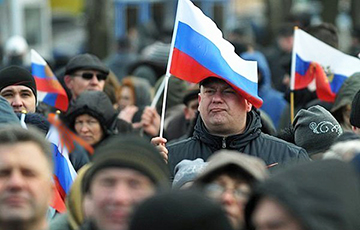Volodymyr Fesenko: Half Of 'Peace Plans' Are Fake
11- 16.04.2024, 20:03
- 29,662

The Ukraine Global Peace Summit confused the Kremlin.
Chinese President Xi Jinping proposed his "peace plan" at a meeting with German Chancellor Olaf Scholz today. It provides four formulations that are as blurred as possible.
Recently, there was also a "Turkish Peace Plan" in the media. Putin is also talking a lot about “peace.” The U.S. media sources are talking about Donald Trump's Peace Plan.
Why have there been so many of these “peace plans” lately? Charter97.org spoke about this with the famous Ukrainian political scientist Volodymyr Fesenko, the head of the Penta Center of Applied Political Surveys:
— Half of the listed "peace plans" are fake. There is no Trump's peace plan, for example. One of the prominent American publications wrote about it, but this is not the plan announced by Trump. These are rumors designed to play against Trump, using his ambiguous position on the Russian-Ukrainian war.
Apparently, there is no Turkish plan either. Turkey nowhere officially confirms that this is its plan. I have already voiced the version that this is, rather, the plan of the Russian oligarch Roman Abramovich, which he promotes through Turkey.
— What is the reason for the fact that there are so many "peace plans" in the information space lately?
— One main factor works here. This explains, among other things, why Putin, Lavrov and Zakharova began to raise this topic often. The fact is that just last week a specific date and venue for the Global Peace Summit was determined. Switzerland will host it on June 15-16.
Naturally, this factor has now made the topic of further peace negotiations more relevant. I emphasize that so far we are not talking about peace negotiations. It is important to understand that the peace summit is not about negotiations with the Russian Federation. This is a discussion of the peace formula of Ukrainian President Volodymyr Zelensky, Ukraine's position on how to end the war and an attempt to find a common platform. First of all, with the countries of the Global South.
So that there is not just a position of Ukraine, but a compromise option, maybe a roadmap for a whole group of states. Further — the Russian Federation either agrees or not.
The Russians are very annoyed by this, and they, of course, will try to disrupt the Global Peace Summit, try to belittle its importance. There is such a political and ideological struggle around the summit. The Russians, on the contrary, are now trying to impose their vision of the peace process. Peace on Russian terms. There is a struggle of oncoming courses: Ukraine is promoting its position, and the Russian Federation is promoting its position.
Naturally, China is also reacting. But in fact, they do not have any specific plan. A year ago, the Chinese Foreign Ministry (not Xi Jinping) declared the Chinese "peaceful position" with 10 principles. It was extremely hypothetical.
Now Xi has personally declared some four principles, but they are also very vague. That's, let's say, not some kind of conflict resolution plan. This is similar to appeals and wishes about what's better not to do.
There is a call for de-escalation of the war. The call is correct, but who is now escalating the war? Putin! That's why you need to contact him directly. But the Chinese do not want to quarrel with the Russians, keeping their abstract-neutral position.
Scholz's visit to China and Xi's future visit to Europe are an attempt by Beijing to once again remind that China is a potential mediator. A very important point is that China will now determine how it reacts to the Global Peace Summit.
Ukraine and Switzerland both invited China, but China has not yet made its choice. They say that it is necessary to invite the Russian Federation. For them, this can be a formal reason for refusal. But I do not exclude that it may not be Xi Jinping, but someone else from China.
The main thing is that China does not interfere with the participation of its friends from the Global South in this summit. Russia will try to put pressure on its Latin American, African, and Asian partners not to participate in the summit. China's position is very important here. They will listen to China. China can influence the decisions of the Global Peace Summit in Switzerland through its partners.
This peacekeeping activity is associated with the Global Peace Summit, which begins with a political struggle around it. This summit will be a kind of crossroads.











